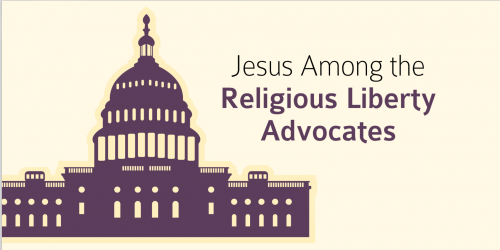On October 17 to 19, 2019, Andrews University hosted the Jesus and Politics Conference, which sought to prompt Christians, especially Seventh-day Adventist Christians, to be reasonably aware of and active in the various goings-on within political, social and economic realms, yet do so upon the bedrock of Christ’s character, teachings, example and ultimate culmination of His kingdom.
This prompting is further enhanced by the reality that our church pioneers did not keep their mouths shut or hands under their bottoms as the movement took shape amid the tragic history of slavery and the U.S. Civil War.
The weekend was comprised of several intriguing and insightful plenary sessions, as well as nearly a dozen breakout tracks that covered a range of specific topics. Here’s a synopsis of key elements of the religious liberty track, featuring four distinguished panelists: Laura Im (panel chairperson) — Public Affairs and Religious Liberty (PARL) director, Michigan Conference; Jonathan Fetrick — pastor andPARL director, Wisconsin Conference; Amireh Al-Haddad — PARL director, Southern Union; Ganoune Diop — PARL director, General Conference.
Some of the marquee themes of the discussion were as follows:
- Laura allocated about ten to twelve minutes to each of the guest representatives to highlight the significant components of their specific activities and overall outlooks related to religious liberty. Jonathan began by summarizing his role as a lobbyist (currently in Madison, Wisconsin’s capital; previously in Olympia, Washington) — one who interacts with government officials, informs them of the impact and ramifications of any given legislation on the public, and encourages them to support and pass laws that uphold basic human rights.
- Jonathan continued by disclosing some of his discovery of the underestimated ubiquity of religious liberty themes in Scripture. In Revelation specifically, the issue transcends chapter 13, the understandable yet myopic focal point of most Adventists. Church-state relations weave through the sequences of churches, seals and trumpets. Furthermore, God’s pivotal, climactic call is for His people to come out of Babylon, a religiopolitical, oppressive coalition that is an affront to heavenly values.
- Amireh’s aegis spans eight states and well over a quarter-million church members. Sabbath work accommodation cases constitute a sizeable portion of her responsibilities (she’s at roughly 3,500 and counting in her 27-year career), and she specifically referenced Quest Diagnostics, a nationwide lab corporation that had changed scheduling protocol, which put many Adventist employees between a rock and a hard place.
- Amireh, with a team of partners, meticulously maintains a living database of elected officials within her region and ensures that they regularly receive Liberty Magazine, which has proven to be an effective outreach mechanism. Waymarksis an in-church equivalent that has substantial circulation throughout the Union.
- Ganoune commenced by sharing a sobering statistic: about five billion people worldwide do not get to experience religious liberty and its benefits. Additionally, in territories where church and state are unified, marginal and minority religions and their adherents tend to suffer.
- He then posed the question, “What is religious liberty?” He asserted that it is beyond being a constitutional principle, since the codification of appropriate policies is one thing (most nations have freedom-based laws in writing), but the execution thereof is another.
- Ganoune’s overarching conviction is that religious liberty is rooted in God and His character. Freedom was God’s first gift to humanity at Creation because His desire was to have relationships predicated on one’s volitional reciprocity of love. Religious liberty is a compound freedom that encompasses all other freedoms (civil, speech, thought, etc.).
These concepts undergird Ganoune’s efforts as an earth-trotting ambassador who communicates with foreign governments, develops awareness and sensitivity, promotes religious liberty for SDAs and non-SDAs alike, and helps dispense the clarion call to all humanity to exercise indiscriminate respect and dignity.
- As the format transitioned from opening-monologue to question-and-answer, Laura invited Ganoune to elaborate more on his global perspective and the extents to which religious liberty is either advancing or eroding in any given nation. He started with the premise that religious liberty is proportional to mutual respect. Unfortunately, a drastic increase in nationalism is crowding out the notion of human solidarity. An example he mentioned was Burundi and its puppeteering of a local Adventist church.
- Amireh expressed concern over a troubling trend in our church — too many Adventists are allowing their political and sociological slants to negatively affect their views of Bible prophecy and religious liberty. She cited the National Prayer Caucus and its Project Blitz campaign, which seeks to infuse a more explicit brand of Christianity into legislation.
- Although the officials in Madison are cognizant of Jonathan’s affiliation with the Adventist Church, because they also know that he is a pastor, they will relate to him more as their chaplain than as a lobbyist. In both the Midwest and Pacific Northwest, he has noticed a counter-pattern to what Amireh faces in the South — a secular humanist paradigm that covets a form of autonomy and bristles at God or any outside source defining morality.
For more information on religious liberty, http://www.adventistliberty.org/ is a good pad from which to launch. For more information on the conference, visit https://www.jesusandpoliticstoday.org/. Additionally, a hearty handful of video recordings are available at the Lake Union HeraldFacebook page.
John Simon is a Michigan-based freelance writer.
